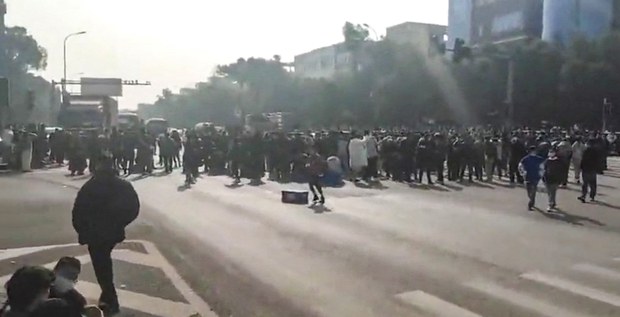INTERVIEW: ‘All of a sudden, all of it was gone’
Share

People protest at the Zybio factory in Chongqing, China, in this screenshot from a video released on Saturday, Jan. 7, 2023.
Angry protests seen at a COVID-19 test-kit factory in the southwestern Chinese city of Chongqing on Jan. 7 came after months of wage theft by labor recruitment agencies, a former Zybio worker said in a recent interview with Radio Free Asia.
Li Hua said he remembers waking up on the morning of Jan. 7 to reports from colleagues on the social media platform WeChat of a protest at Zybio’s Dadukou factory, which hired thousands of migrant workers to meet skyrocketing demand for COVID-19 test reagents during the mass testing and rolling lockdowns of the zero-COVID policy, which ended last month.
“I called one of the intermediaries [labor recruitment agencies], but they weren’t honest with me,” he said.
Li got on his bicycle and headed down to Jianqiao Industrial Park, 20 kilometers (12 miles) away.
Once there, he shot several video clips of the protests. Social media footage at the time showed protesters throwing traffic cones, boxes and stools at police with riot shields, or shouting, “Give us back our money!”
Workers smashed machinery and equipment in the factory and fought off fully equipped riot police with rocks and random debris, according to videos uploaded to social media platforms.
Li’s videos showed workers beating up managers and recruitment agents, as well as negotiating with representatives of the district government. He estimated that several thousand people were at the scene.
Li had initially been recruited by a labor agent promising more than 40 yuan (U.S. $6) an hour, but was paid nowhere near that amount when he showed up for work.
“The official wage offered by the company was more than 40 yuan/hour, but when we actually went to work there, the most we would get would be 17 yuan per hour,” he said. “Later, they added an extra three yuan because of the pandemic, bringing it up to 20 yuan/hour.”
Li resigned after less than 10 days in the job, enraged at the treatment of workers.
“Workers in this factory weren’t treated like people; more like horses or cattle,” he said. “Every team leader was given a microphone, and they’d be yelling through it all day long; they didn’t treat the workers as their equals at all.”
Workers’ toilet breaks were restricted to just two visits of no more than 10 minutes during working hours.
Most of the workers were lured to work there by the promise of an attendance bonus of 3,000 yuan (U.S. $450) and additional overtime payments for working during the Lunar New Year, Li said.
“All of a sudden, all of it was gone,” he said, in a reference to Zybio’s decision to lay off thousands of workers hired to meet demand for reagents that were no longer needed. “Taken together with the fact that they were already suffering, it exploded [into violent protest] all of a sudden.”
A company employee told RFA’s Cantonese Service on Jan. 8 that business has ground to a halt.
“The company isn’t taking orders any more, and a lot of orders have been received but not fulfilled,” the employee said.
‘They couldn’t keep it up any longer’
According to Li, the district government sent officials to negotiate with protesting workers on the afternoon of Jan. 7. The workers eventually accepted a deal put forward by the district government on Jan. 8, he said.
Under the deal, the hourly wage was set at 23 yuan/hour up until Dec. 14, when the rate rose to 28 yuan/hour, along with a one-off payment of 1,000 yuan to workers being sent home, just one third of the 3,000 bonus that was originally promised, he said.
This left the workers worse off than under the deal they signed up for and unhappy with the outcome, Li said.
“The main reason [they accepted it] is because it had been dragging on for a long time by then, and everyone was tired, cold and hungry,” he said. “There was nothing to eat, and a lot of people hadn’t slept, so they couldn’t keep it up any longer.”
A night-shift manager at the Huiye labor agency surnamed Hu declined to comment when contacted by Radio Free Asia on Tuesday.
Repeated calls to Zhening, another agency involved in recruiting workers for Zybio rang unanswered during office hours on Tuesday, while an employee who answered the phone at a third agency — Shenfa — declined to comment.
An official who answered the phone at the Dadukou district government referred inquiries to the propaganda office of the ruling Chinese Communist Party district-level committee. But no contact information was publicly available for the office.
Zybio hadn’t responded to emailed requests for comment by the time of writing on Jan. 9.
Li is now looking for another job, and is anxious because he no longer trusts any of the agencies.
New York-based labor activist Hua Haifeng said many manufacturers use labor recruitment agencies to handle labor needs, enabling them to distance themselves from any disputes by referring complaints back to the agencies.
“If companies recruit workers directly, then they have to deal with a bunch of different problems, so they use these agencies, and then blame them for any problems that arise,” Hua said, citing disputes at Apple supplier Pegatron, which he said used the same recruiters as Zybio.
Hua said spontaneous protests like the one at Zybio don’t add up to a large-scale labor movement, and that mass labor movements like the Jasic strike of 2018 were much harder to organize now due to more effective censorship of social media.
Translated by Luisetta Mudie.







